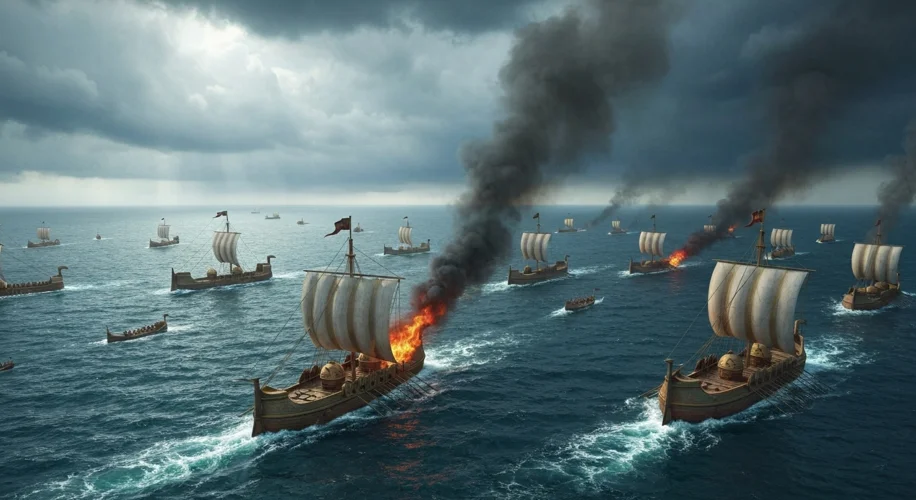The salty spray of the Ionian Sea stung the faces of thousands. Oars churned the water into a frothy chaos, propelling massive warships towards a collision course. The year was 31 BCE, and the fate of Rome, the Republic that had ruled the known world, hung precariously in the balance. This was not just a battle; it was the thunderous climax to a drama that had captivated the Roman world, a struggle for power between two titans: Octavian, the coolly calculating heir of Caesar, and Mark Antony, the charismatic general entangled in a passionate affair with the Egyptian queen, Cleopatra.
Picture this: a vast expanse of sea, shimmering under the Mediterranean sun, soon to be stained crimson. On one side, the formidable fleet of Octavian, led by his brilliant admiral Marcus Agrippa. On the other, the combined naval might of Antony and Cleopatra, a force whose very presence on the waves was a testament to their ambition and a symbol of their defiance. The air hung heavy with the stench of sweat, fear, and the brine of the sea, a prelude to the violence that was about to erupt.
Rome, in the aftermath of Julius Caesar’s assassination, had been a cauldron of political intrigue and civil unrest. The Second Triumvirate – Octavian, Antony, and Lepidus – had initially joined forces to restore order, but power, as it often does, began to corrupt and divide. Lepidus was sidelined, leaving Octavian and Antony to carve up the Roman world. Antony, stationed in the East, fell deeply under the spell of Cleopatra VII, the last pharaoh of Egypt. Their alliance, fueled by love and political expediency, was seen by many in Rome, particularly the conservative factions and Octavian himself, as a dangerous orientalization of Roman values and a direct threat to the Republic.
Octavian, ever the shrewd politician, skillfully used propaganda to paint Antony as a man bewitched, a Roman hero abandoning his duties for a foreign queen. He rallied support, emphasizing Antony’s perceived betrayal of Roman traditions and his growing reliance on Egyptian wealth and influence. Cleopatra, a ruler of immense intellect and ambition, saw Antony as a key to securing Egypt’s future and her dynasty’s survival. She brought her considerable resources and her own fleet to bear, believing in Antony’s strength and her own influence.
The stage was set. Antony and Cleopatra, with a larger but perhaps less unified fleet, sailed from their base in Greece, aiming to confront Octavian. Octavian, however, had chosen his ground carefully. Agrippa had successfully blockaded Antony’s forces in the Gulf of Ambracia. By the late summer of 31 BCE, Antony’s fleet was trapped, supplies were dwindling, and morale was suffering. The ensuing standoff was tense, a waiting game played out on the unforgiving sea.
Finally, on September 2nd, 31 BCE, Antony made his move. The Battle of Actium commenced not with a thunderous charge, but with a strategic unfolding of naval power. Antony’s massive quinqueremes, formidable in their own right, were designed for ramming and boarding. Octavian’s fleet, composed of lighter, faster ships, was more agile. The battle was a brutal ballet of wood, bronze, and human lives. Agrippa’s tactical brilliance began to shine as his ships outmaneuvered their larger counterparts. The close-quarters combat was ferocious, the air filled with the clash of swords, the cries of wounded men, and the roar of flames as ships caught fire.
Little did anyone know, the tide of battle would turn not just on the waves, but in the very air above them. As the fighting raged, Cleopatra’s squadron, a contingent of sixty ships, broke formation and fled the engagement, heading south. Antony, seeing his beloved’s ships retreat, made a fateful decision. He abandoned his struggling fleet and followed her, leaving his men to fight and die without their commander. This act of desertion sealed the fate of the battle and, arguably, the Roman Republic itself.
The remaining forces of Antony and Cleopatra were surrounded. Agrippa, pressing his advantage, inflicted a crushing defeat. Many ships were sunk, and thousands were captured. The sight of Antony’s flagship ablaze and his army surrendering was a grim testament to their ruin. Octavian had won.
The consequences of Actium were profound and far-reaching. Antony and Cleopatra, defeated and pursued, eventually met their tragic end in Egypt. Their deaths marked the end of the Ptolemaic dynasty and the absorption of Egypt into the Roman Empire, a rich prize that Octavian would leverage to solidify his power. More significantly, the Battle of Actium extinguished the last vestiges of organized opposition to Octavian. With his rivals gone, he returned to Rome not as a triumvir, but as the undisputed master of the Roman world.
Octavian, now known as Augustus, skillfully navigated the transition from a republic that had grown weary of civil war to the Principate, the first Roman Empire. He presented himself as the restorer of peace and order, a savior who had ended decades of strife. The immense wealth of Egypt funded his reforms and patronage, enabling him to secure loyalty and build monumental structures that proclaimed Rome’s new era of power and prosperity.
The Battle of Actium was more than just a naval engagement; it was the pivotal moment that closed the chapter on the Roman Republic and ushered in the age of emperors. It was a testament to the power of astute political maneuvering, strategic naval warfare, and the enduring human drama of love, ambition, and betrayal. The echoes of those oars, the clash of steel, and the cries of surrender at Actium resonated through centuries, shaping the very foundations of Western civilization.


